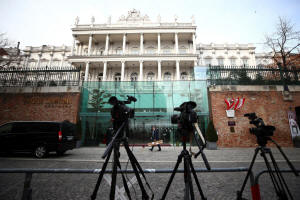West asks whether Iran is serious or stalling as nuclear talks set to
resume
 Send a link to a friend
Send a link to a friend
[November 29, 2021]
By Parisa Hafezi and Francois Murphy
VIENNA (Reuters) -Iran and world powers
will meet in Vienna on Monday to try to salvage their 2015 nuclear deal
but with Tehran sticking to its tough stance and Western powers
increasingly frustrated, hopes of a breakthrough appear slim.
Diplomats say time is running low to resurrect the pact, which then-U.S.
President Donald Trump abandoned in 2018, angering Iran and dismaying
the other powers involved - Britain, China, France, Germany and Russia.
Six rounds of indirect talks were held between April and June. The new
round, due to begin at 1300 GMT in Vienna, begins after a hiatus
triggered by the election of hardline cleric Ebrahim Raisi in June as
Iran's president.
Tehran's negotiating team has set out demands that U.S. and European
diplomats consider unrealistic, Western diplomats say.
"Our demands are clear. Other parties and especially Americans should
decide whether they want this deal to be revived or not. They abandoned
the pact, so they should return to it and lift all sanctions," an
Iranian official close to the talks told Reuters.
Iran's demands include the dropping of all U.S. and European Union
sanctions imposed since 2017, including those unrelated to Iran's
nuclear programme, in a verifiable process.
Iran's foreign ministry ruled out the possibility of direct meeting
between Iranian and U.S. officials in Vienna.
"Traditional informal coordination meeting of #JCPOA participants
(without #Iran and the #US) is convened in preparation for the official
meeting of the Joint Commission and the opening of the seventh round of
the #ViennaTalks," Russia's envoy to the U.N. nuclear watchdog, Mikhail
Ulyanov, said on Twitter.
TENSIONS
In parallel, Tehran's conflicts with the U.N. atomic watchdog, which
monitors the nuclear programme, have festered.
As Iran has pressed ahead with its uranium enrichment programme, the
International Atomic Energy Agency says its inspectors have been treated
roughly and refused access to reinstall monitoring cameras at a site it
deems essential to reviving the deal.
"If Iran thinks it can use this time to build more leverage and then
come back and say they want something better, it simply won't work. We
and our partners won't go for it," U.S. envoy Robert Malley told BBC
Sounds on Saturday.
Since Trump took the United States out of the deal, Iran has breached
many of its restrictions meant to lengthen the time it would need to
generate enough fissile material for a nuclear bomb . Iran says it wants
to enrich uranium only for civil uses.
[to top of second column]
|

Cameras stand outside Palais Coburg, the site of a meeting of the
Joint Comprehensive Plan of Action (JCPOA), in Vienna, Austria,
November 29, 2021. REUTERS/Lisi Niesner

Malley warned that Washington would be ready to ramp
up pressure on Tehran if the talks collapse.
The Islamic Republic's clerical rulers insist that its focus is
purely the lifting of sanctions rather than nuclear issues.
"To ensure any forthcoming agreement is ironclad, the West needs to
pay a price for having failed to uphold its part of the bargain. As
in any business, a deal is a deal, and breaking it has
consequences," Iran's top nuclear negotiator, Ali Bagheri Kani, said
in a defiant column in the Financial Times on Sunday.
"The principle of 'mutual compliance' cannot form a proper base for
negotiations since it was the U.S. government which unilaterally
left the deal."
Diplomats have said Washington has suggested negotiating an
open-ended interim accord with Tehran as long as a permanent deal is
not achieved. Several Iranian officials told Reuters Iran had no
intention of accepting an interim deal.
Iran's arch-enemy Israel, which opposed the original deal as too
limited in scope and duration, has said military options would be on
the table if diplomacy fails to reinstate the pact.
"They (Iranians) will play for time, earn billions from the removal
of sanctions, continue to deceive the world, and covertly advance
their nuclear programme," Israeli Foreign Minister Yair Lapid told
reporters in London.
"This is what they have done in the past, and it is what they will
do this time as well. The intelligence is clear. It leaves no
doubt."
(Writing by John Irish and Parisa Hafezi; Editing by Timothy
Heritage and Mark Heinrich)
[© 2021 Thomson Reuters. All rights
reserved.] Copyright 2021 Reuters. All rights reserved. This material may not be published,
broadcast, rewritten or redistributed.
Thompson Reuters is solely responsible for this content. |